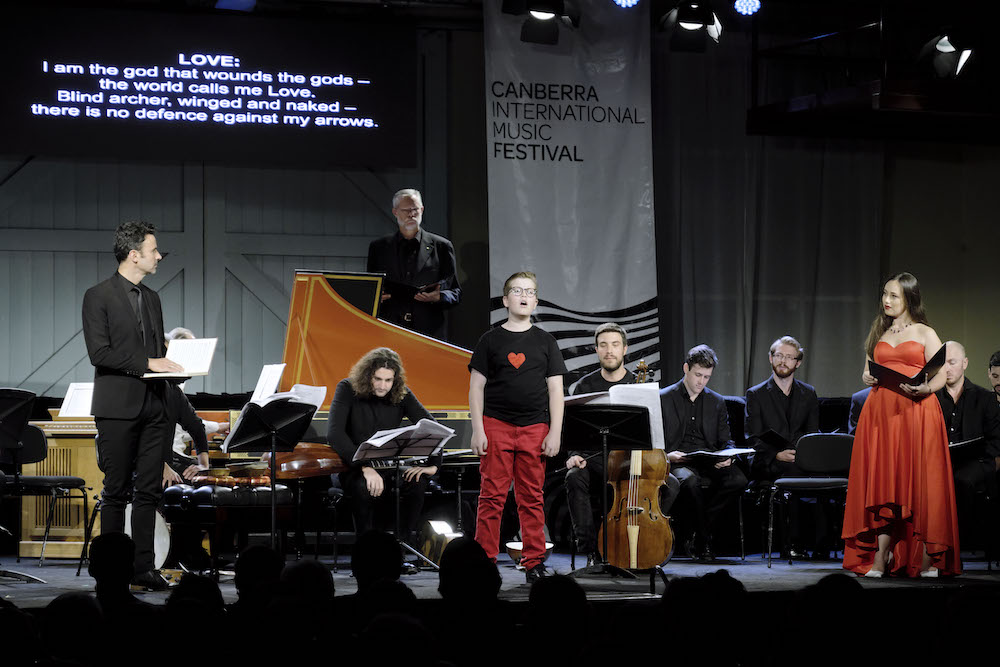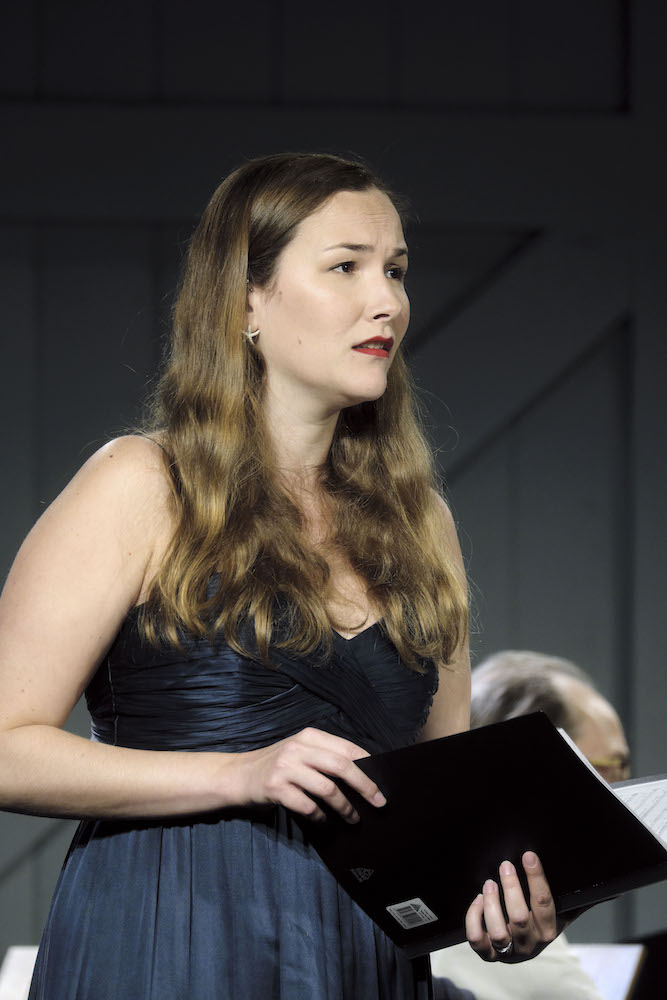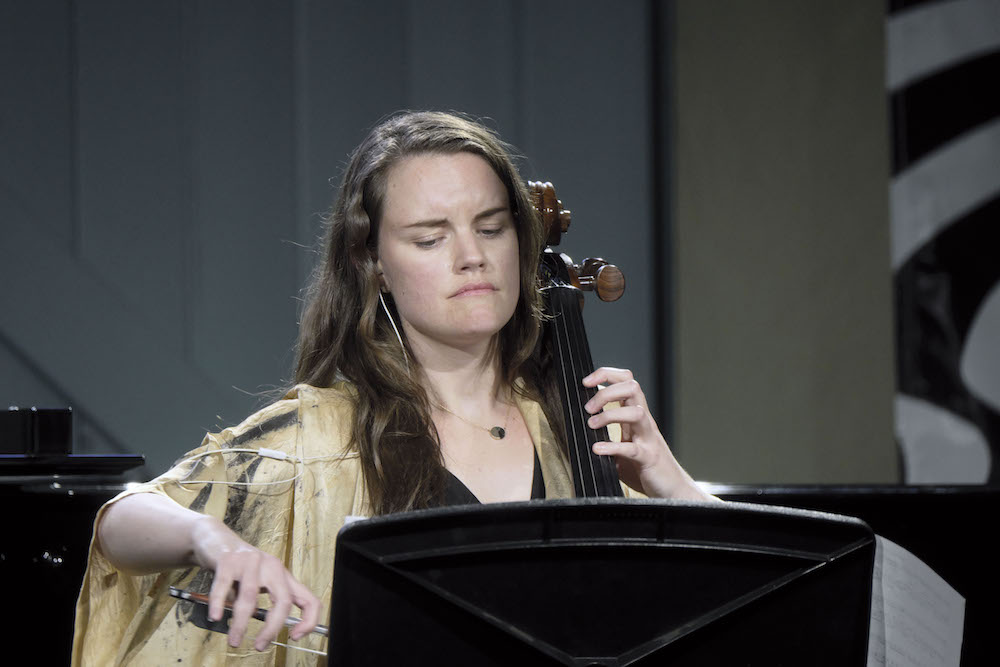Fitters’ Workshop, Canberra
May 2, 2018
In Australia we’re relatively inured from the turbulence that’s displacing people in other parts of the world, from Syria to Venezuela, but it’s this displacement that Canberra International Music Festival AD Roland Peelman sought to highlight in the 13th concert of the festival, Ulysses Now, which presented music from Monteverdi’s opera Il Ritorno di Ulisse in Patria alongside contemporary Australian works in an intelligent, thought-provoking program.
 Monteverdi’s Il Ritorno at the Canberra International Music Festival. Photo © Peter Hislop
Monteverdi’s Il Ritorno at the Canberra International Music Festival. Photo © Peter Hislop
Monteverdi’s Opera – based on the second half of Homer’s Odyssey – focusses on Ithaca, where Penelope is anxiously awaiting the return of her husband, King Ulisse, from the Trojan Wars. Opening with the Prologo – after the musicians of early music group I Bassifondi allowed the ears to adjust from the Glass Games earlier in the afternoon to the sounds of lute and theorbo in a Sfessania and Pasacaglia by Kapsberger – the scene was set with the warm-toned countertenor of Tobias Cole as Human Fragility, bass Andrew Fysh as Time, soprano Chloe Lankshear as Fortune and 12-year-old treble Wynton Johnstone putting in a fine performance as Love, demonstrating a precocious command of Monteverdian ornamentation. Mezzo AJ America also put in a fine, clear-toned turn as Penelope’s nurse Ericlea.
 Mezzo-soprano Kate Howden at the Canberra International Music Festival. Photo © Peter Hislop
Mezzo-soprano Kate Howden at the Canberra International Music Festival. Photo © Peter Hislop
But it was Penelope – sung by Australian mezzo-soprano Kate Howden – who was centrestage in this suite of highlights, delivering a dark, lush performance of Penelope’s Lament, Di misera regina. Her voice was full-toned, with an easy resonance, the timbre brightening as she sung of Ulisse’s “longed for day of return.”
After Penelope rejects her three suitors (Fysh, Cole and tenor Dan Walker) in a scene from the opera’s second act, the court burst into song, the chorus – Luminescence Chamber Singers – and soloists capping off this tantalising taste of Il Ritorno in style.
The sound world changed completely for the second half, though with the set of contemporary works the program traced a line of war and displacement from the present day back through to BC. From Monteverdi’s stylised exploration of war-time suffering, Alex Pozniak’s 2014 piano quartet In Search of Asylum – written for the Australia Piano Quartet as part of a project based around asylum seekers and Australia’s contentious off-shore detention policy – was a more tempestuous offering. Opening with tenebrous rumblings, dissonant clashes, skittering string harmonics and metallic rattling – Peelman elbow deep in the piano – with suggestions of wailing or sirens ever present in the bending pitches, the work became more expansive as it moved towards its conclusion, but if there was a sense of reprieve there was little sense of optimism.
CIMF Composer in Residence Mary Finsterer’s Angelus for clarinet, cello and piano was therefore a sea of calm after the Pozniak, gentle, undulating bell-like figures given a low-key but nonetheless implacable momentum by Rachael Shiphard’s piano. While there were some magical moments – the first beautifully blended unison note between Magdalenna Krstevska’s clarinet and Stephanie Arnold’s cello, for instance – there were also a few technical imperfections. The performance was nonetheless moving, though, and perfectly placed within the program.
 Cellist Stephanie Arnold at the Canberra International Music Festival. Photo © Peter Hislop
Cellist Stephanie Arnold at the Canberra International Music Festival. Photo © Peter Hislop
Robert Davidson and Stephanie Arnold’s 2016 work Across the Water for cello and electronics gives voice to Melbourne-based asylum seekers who were interviewed by Arnold, their stories set to music using techniques similar to those Robertson employed in works like his Stalin’s Piano, performed at last year’s CIMF. Arnold’s cello picked up the rhythms and inflections of the spoken words, the interplay between recorded voices and the cello line almost like that between voice and piano in lieder, in a performance of engaging music and heart-rendingly vivid story-telling across three movements, beginning with Respected as a Human.
Across the Water was powerful, especially presented at the end of this program. In Davidson’s previous political works – such as Stalin’s Piano, Total Political Correctness and his setting of Julia Gillard’s ‘misogyny speech’ – his compositional techniques have had an element of comic exaggeration to them, a kind of musical caricature, but in this work the effect was more serious, encouraging a deeper analysis of – or meditation on – every word, every turn of phrase spoken as those who have sought asylum in this country told their stories.
Canberra International Music Festival takes place in venues across Canberra until May 6











Comments
Log in to join the conversation.